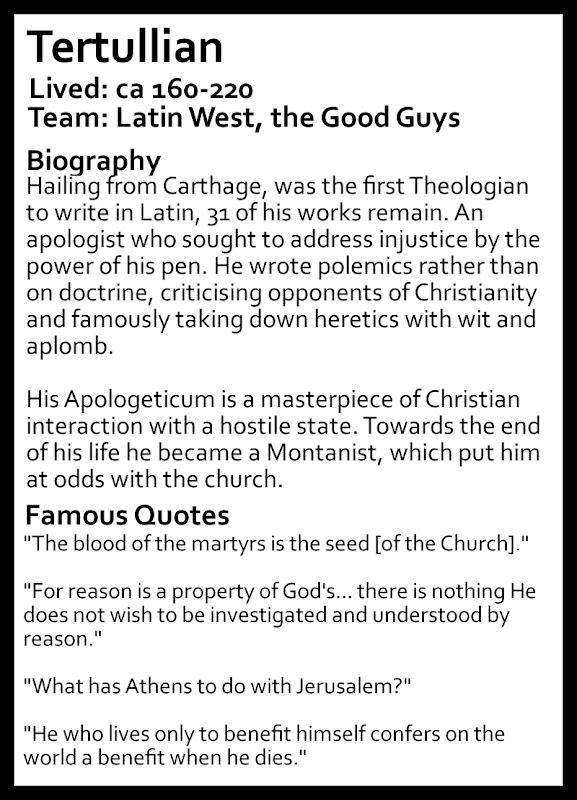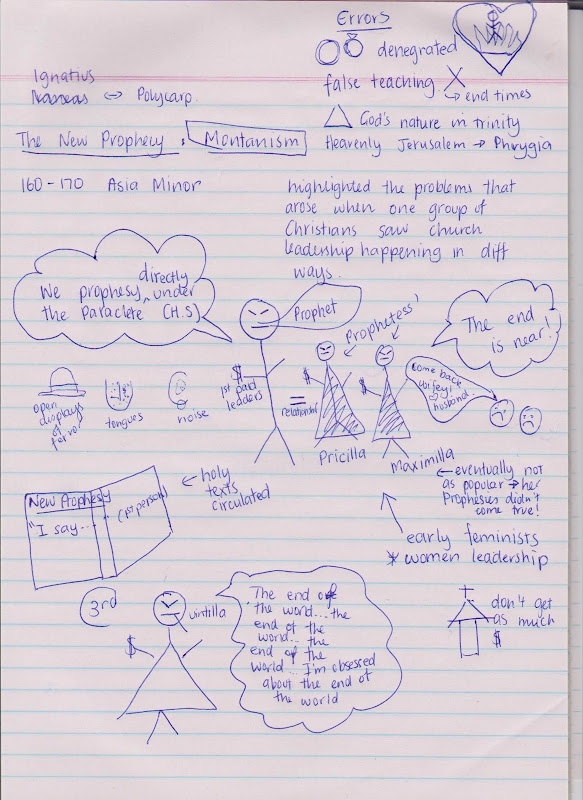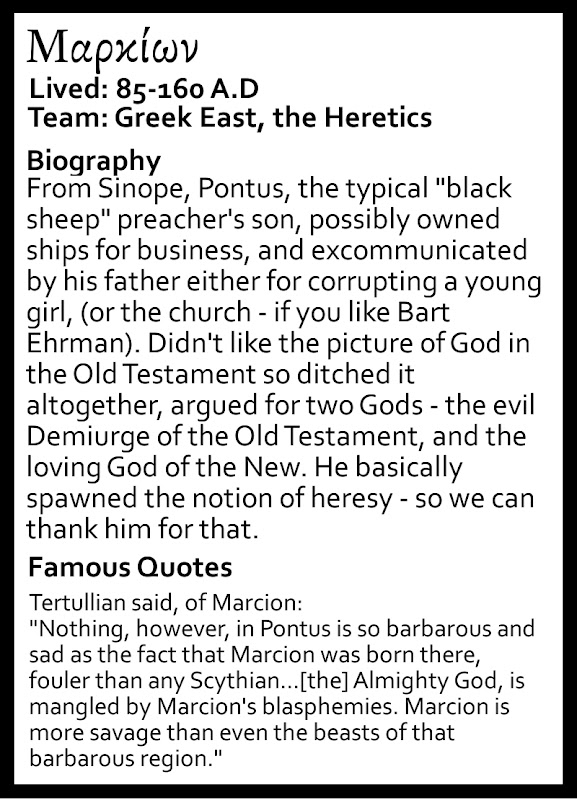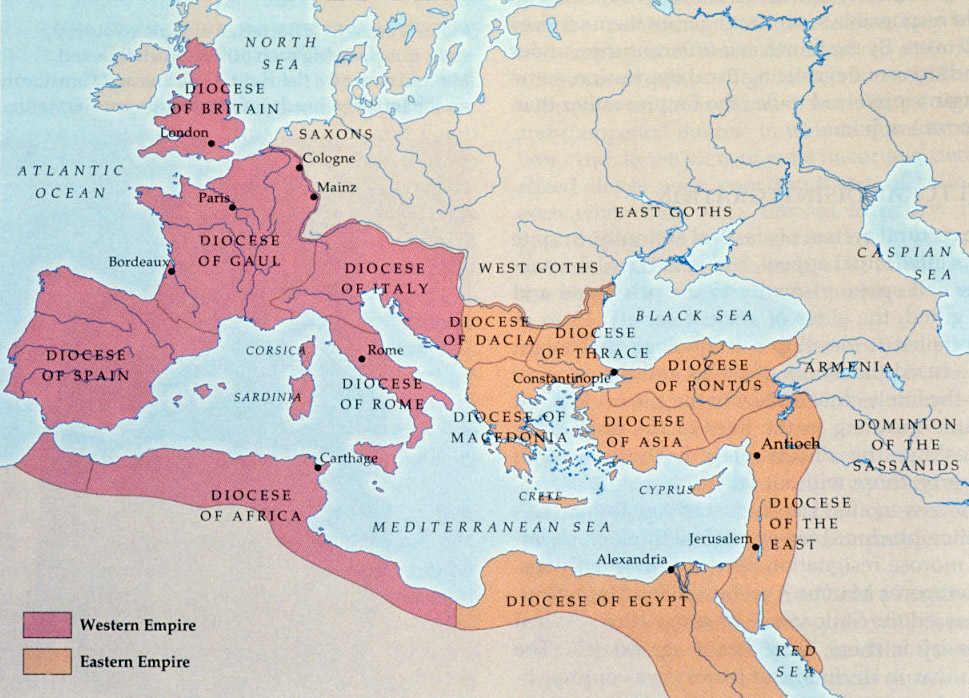Tertullian is one of my favourite, if not my favourite writers from early church history. He writes acerbically with wit and biting sarcasm. There’s just something that resonates with me about the good guys from the Latin West (Augustine is cool too). Tertullian’s Apology is a must read. Check out the Tertullian Project for a batch of Tertullian flavoured resources.


Legend: L = Latin West, A = Apologist, Scroll = Author of primary documents you should read, Thumbs up = Theologically sound (mostly), Thumbs Down = Became a Montanist (which actually stopped him becoming a Catholic Saint, so it might have been worth it).
Here’s a sample from the Apology:
On the Legal Process for charges against Christians
“BUT if it is resolved we must be guilty, pray what is your reason for treating us differently from other criminals ? For it is a rule in law that where the case is the same, there the procedure of court ought to be the same also. But when we and heathens are impeached upon the same articles, the heathen shall be allowed the privilege of the council, and of pleading in person for setting off his innocence, it being against law to proceed to sentence before the defendant has put in his answer; but a Christian is permitted nothing, not to speak what is necessary, either to justify his cause, defend the truth, or prevent the injustice of his judges. On the contrary, nothing is attended to in his trial, but how to inflame the mob, and therefore the question is about his name only, and not the nature of his crime : whereas if you sit in judgment upon another criminal, and he pleads guilty to the indictment, suppose of homicide, sacrilege, incest, or rebellion (to instance the common
heads of your libels against us), upon such confession, I say, it is not your method forthwith to proceed to sentence, but you have patience to examine the nature of the fact in all its circumstances, viz.—the place, the time, the manner, and the accomplices of the action: but in the trial of a Christian, all these forms of justice are overruled.
On the foundation of Common Charges against Christians
…you ought on both sides to be equally severe in the examination of fact, and see to the bottom of those reports, so frequently and so falsely thrust upon us. For instance, to bring in a true list of how many infants every Christian has killed and eaten, what incests committed in the dark, what cooks we had for the dressing these children’s flesh, and what pimping dogs for putting out the candles.
On the response to changes wrought in people’s lives when they become Christians
Thus indeed they praise what they know, but vilify what they know not; they blot the fairest examples of virtue shining in their very eyes, because of a religion they are entirely in the dark about; whereas certainly, by all the rules of reason, we ought to judge of the nature of causes we see not, by the effects we see, and not pre-condemn apparent goodness for principles we understand not. Others, discoursing of some persons, whom they knew to be vagrants, and infamously lewd before they came over to our religion, drop their praises upon them in such a manner, that they stigmatize them with their very compliments; so darkened are they with prejudice that they blunder into the commendation of the thing they would condemn. For (say they) how wanton, and how witty was such a woman ! how amorous and frolicsome was such a young gentleman ! but now they are Christians : thus undesignedly they fix the amendment of their lives upon the alteration of their religion.
On the New Atheists (before they were even invented):
Some others are arrived to that pitch of aversion to the very name of Christian, that they seem to have entered into covenant with hatred, and bargained to gratify this passion at the expense of all the satisfactions of human life, acquiescing in the grossest of injuries rather than the hated thing of Christian should come within their doors.
On the Meaning of the word Christian
“But Christians is a Greek word, and means nothing more than a disciple of Christ, which by interpretation is the Anointed; and when you misname it Chrestian1 (for so far are you from understanding our religion, that as yet you know not our true name), even then it implies nothing worse than a benignity and sweetness of temper; thus outrageous are you at the sound of a name as inoffensive and harmless as those who bear it. But do men use to let loose their passions at this rate against any sect merely from the name of its founder ? Is it a new thing for scholars to be named from their masters? Is it not from hence that philosophers are called Platonists, Epicureans, Pythagoreans, etc.?”






